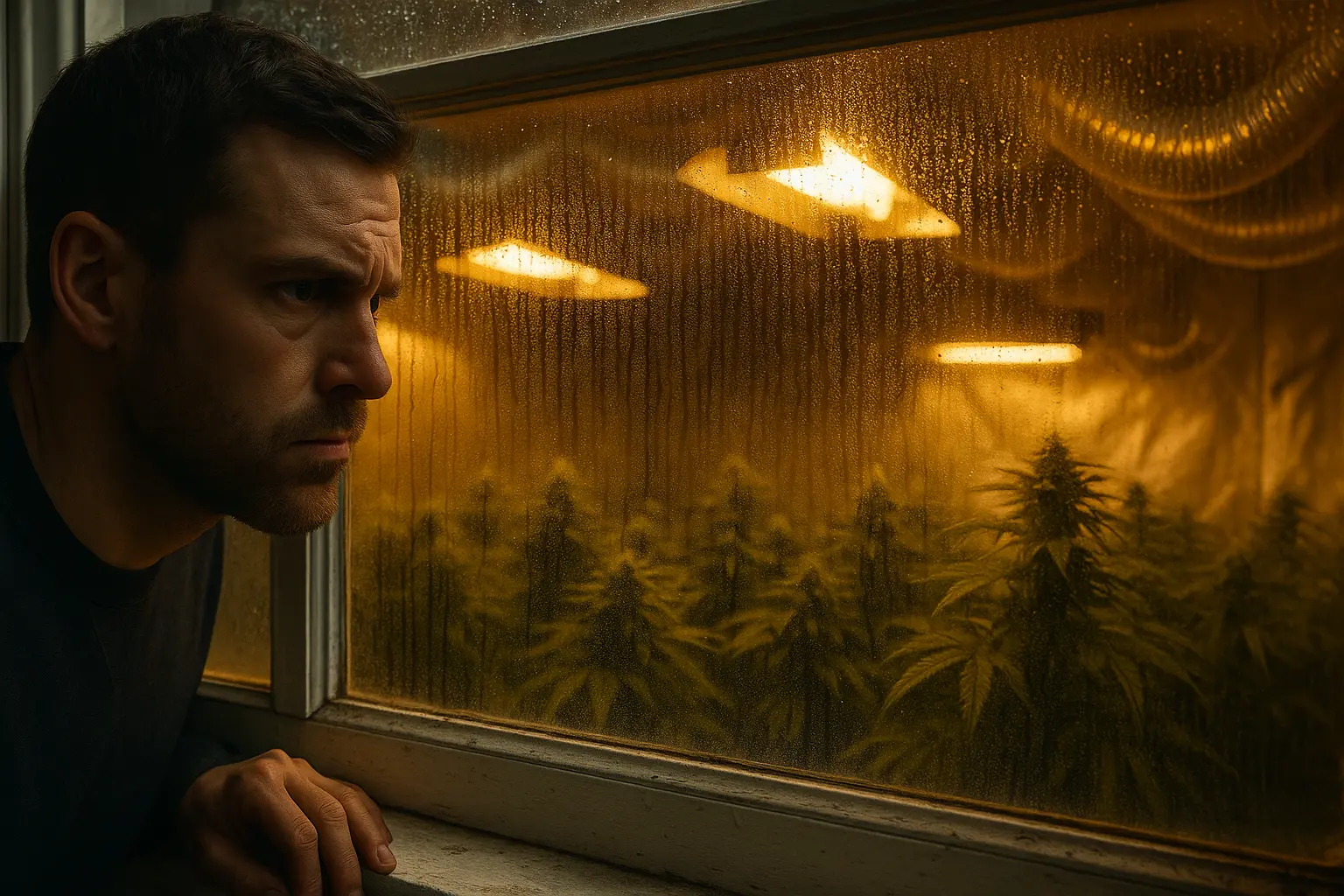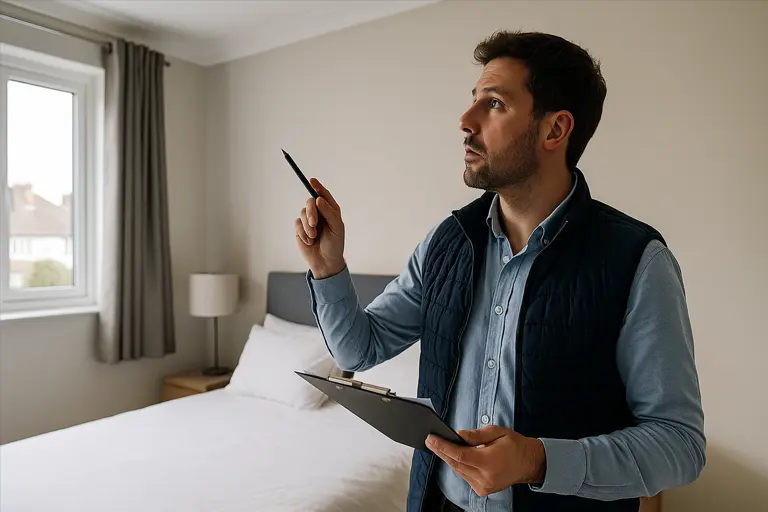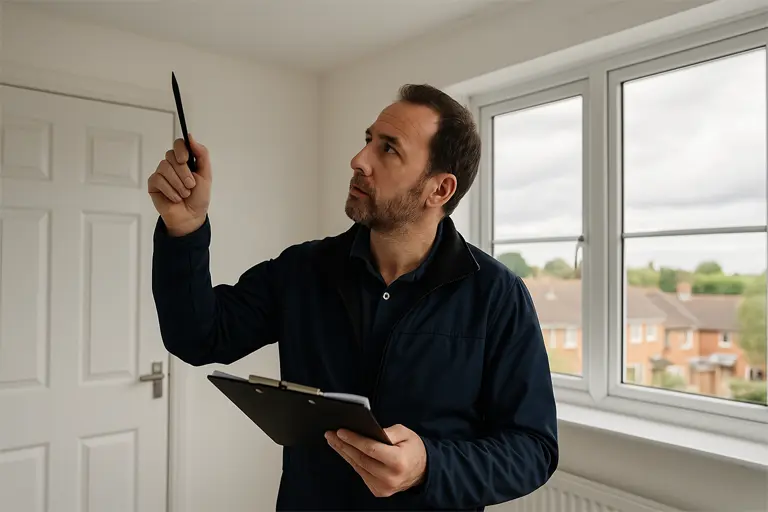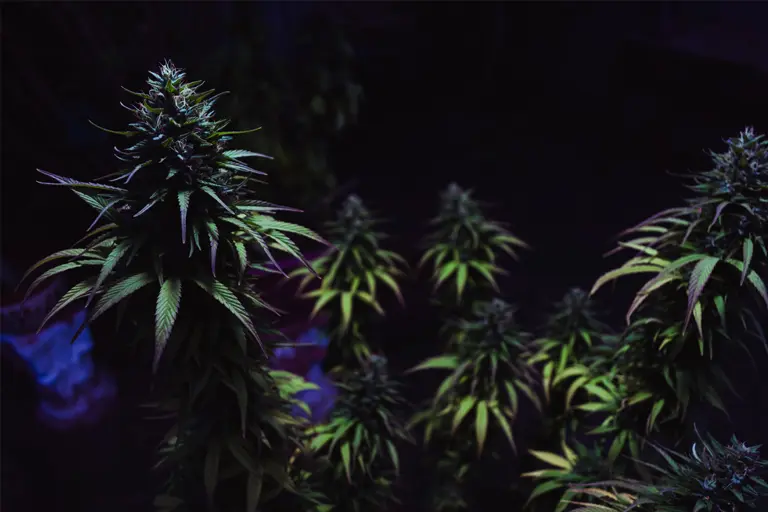It starts with a smell, sweet, skunky, and hard to miss. Maybe you’ve noticed strange activity at odd hours. Windows constantly covered. Bright lights on at night. A low hum of ventilation. You might start wondering:
Is my neighbour growing cannabis?
It’s a question more and more people in the UK are asking, and not without reason.
According to recent police reports, organised criminal gangs are increasingly setting up cannabis farms in ordinary rented homes across the country. They choose quiet suburban streets or blocks of flats where they hope not to draw attention. But behind those curtains could be a dangerous operation.
And it’s not just about illegal drugs. Cannabis farms pose serious safety risks to neighbouring households, from fire hazards and toxic mould to violent break-ins by rival gangs.
So if something feels off, you’re not being nosy, you’re being vigilant.
In this guide, we’ll walk you through:
- The warning signs to look out for
- What to do (and what not to do)
- How to report your concerns safely
- What to expect if police investigate
Because when it comes to cannabis farms, early action can prevent real danger, to you, your family, and your community.
Cannabis farms don’t always look like something out of a crime drama. In reality, many are hidden behind the closed doors of seemingly ordinary homes, in quiet neighbourhoods, busy city streets, or even the flat next door.
But while these illegal setups are designed to avoid attention, they can leave subtle clues. As a neighbour, you may be the first and only person likely to notice something isn’t quite right.
That makes your instincts valuable, and potentially lifesaving.
Spotting the early warning signs of a cannabis grow can help prevent fire hazards, toxic mould, damage to shared structures, and criminal activity spreading into your community.
This section highlights some of the most common red flags. While none of these alone confirm illegal activity, a combination of them, especially when persistent, should prompt you to consider reporting your concerns.
Common Signs That May Indicate a Cannabis Farm
| Warning Sign | What to Look For |
|---|---|
| Condensation on Windows | Visible even in warm weather, due to high humidity inside |
| Blacked-Out Windows | Curtains constantly closed or windows covered with foil or boards |
| Strong, Unusual Smells | A persistent skunky odour, often masked by air fresheners |
| Bright Lights on 24/7 | Glows from windows or attic vents, especially at odd hours |
| Frequent Visitors at Odd Times | Short stays, often late at night or early morning |
| Buzzing Sounds or Fans | Constant humming from extraction equipment inside |
| Bypassed or Tampered Meters | Signs of electrical box tampering, illegal electricity use |
🚫 Important: Don’t attempt to confirm these signs yourself. Never try to enter the property, inspect windows, or confront occupants. Doing so could put you in danger and may interfere with police investigations.
Instead, document what you’ve observed and report it appropriately, we’ll cover how to do that in the next section.

It’s natural to feel protective of your home, your street, and your neighbours. So when you suspect that something illegal is happening next door, especially something as serious as a cannabis farm, the urge to take action can be strong.
But there’s a critical difference between being a concerned citizen and becoming personally involved in a potentially dangerous situation.
What may appear to be a harmless DIY grow operation could, in fact, be part of a larger criminal network. These setups are often maintained by people working under coercion or direction, and while the activity may be happening inside a home, the consequences of interfering can be anything but domestic.
That’s why the most important thing you can do is to avoid direct involvement.
No matter how confident you are in your suspicions, or how frustrated you may feel, investigating the matter yourself puts you, your family, and even your neighbours at risk, and could complicate any official investigation.
This section explains why it’s so important to keep your distance and let the authorities do their job, safely and lawfully.
🚫 You Could Be Placing Yourself in Serious Danger
Cannabis farms are often run by organised criminal gangs, and the people inside may be involved in far more than just growing plants. Rival gangs have been known to carry out violent raids, and growers may take extreme measures to protect their operation.
Even a seemingly harmless tenant, known as a “gardener”, may be under instruction to protect the site at all costs.
Approaching or confronting them could provoke violence, trigger panic, or lead to legal complications if things escalate.
⚠️ You Risk Compromising a Police Investigation
If there is an active investigation, your interference, even unintentional, could alert suspects, destroy evidence, or make it harder for police to act.
Surveillance, warrants, and operations take time to organise. Acting independently can throw off months of planning or jeopardise a safe outcome.
🛑 You Have No Legal Authority to Search or Enter
Even if you’re convinced something illegal is happening, you do not have the right to enter or search someone else’s property. Doing so could result in legal consequences for trespassing, harassment, or privacy violation.
The safest and smartest action is simple:
📞 Don’t get involved directly, report it to the police or Crimestoppers and let professionals handle it.
We’ll explain exactly how to do that in the next section.
Read our article: The Growing Risk of Cannabis Farms in UK Rental Properties
How to Report It Safely and Anonymously
If you believe your neighbour is operating a cannabis farm, the most important step you can take is to report it, but it must be done safely, lawfully, and ideally without putting yourself at risk.
Here’s exactly how to do that:
📞 Option 1: Call 101 (Non-Emergency Police Line)
If you suspect illegal activity but there is no immediate danger, contact the police on 101.
Be ready to provide:
- The property address
- A description of what you’ve observed
- Approximate dates and times
- Any details about suspicious behaviour or visitors
You don’t need hard proof. Police would rather check out a genuine concern than have a dangerous situation go unreported.
🕵️ Option 2: Report Anonymously to Crimestoppers
Want to remain completely anonymous?
Use Crimestoppers UK, a secure, independent charity that passes reports to law enforcement without identifying the source.
🔗 Report online: crimestoppers-uk.org
📞 Call anonymously: 0800 555 111
You’ll never be asked for your name or contact information, and your tip could play a crucial role in disrupting organised crime.
🚨 Option 3: Call 999 (Emergency Only)
If you believe:
- The property is a fire risk (e.g. you see smoke, smell burning, or notice exposed wires)
- There’s an immediate threat to life or safety
- A crime is actively in progress
Call 999 and explain the situation clearly.
🧾 What to Report (Even If You’re Unsure)
You don’t need to be certain, just provide details such as:
- Strong odours (especially skunk/cannabis smell)
- Covered windows or black-out blinds 24/7
- Excess condensation or extractor fan noise
- Suspicious comings and goings
- Signs of electrical tampering or bright lights
Even small pieces of information can help build a larger investigation.
In the next section, we’ll explain what happens after you report it, and how it may affect you as a neighbour.
professional Property Inspections
Stay compliant, avoid costly surprises, and protect your property from just £30 + VAT.
Get started with a free consultation today.
What Happens After You Report It
Once you’ve made a report, whether through the police or anonymously via Crimestoppers, it’s natural to wonder what will happen next. You might worry about whether your information will be taken seriously, or if your identity will be revealed.
Here’s what typically happens after you raise your concern:
🕵️♂️ 1. Police May Begin Discreet Monitoring
If your report includes enough detail to raise concern, police may:
- Monitor the property discreetly
- Conduct background checks on the occupants
- Work with utility companies to identify abnormal power usage
- Deploy surveillance or intelligence gathering without making their presence obvious
You likely won’t be informed of these steps, and that’s normal. Investigations are sensitive, and premature disclosure could put officers or evidence at risk.
🧾 2. Officers May Apply for a Warrant
If sufficient evidence is gathered, police may seek a search warrant to enter the property legally. This can lead to:
- A formal search of the home
- The discovery and dismantling of cannabis cultivation equipment
- Arrests of those involved (including so-called “gardeners”)
This process can take time, days, weeks, or even longer, depending on the complexity of the case.
🏠 3. The Property May Be Boarded Up or Investigated Further
After a raid, the property may be:
- Sealed for safety reasons (due to fire risk or tampered electrics)
- Searched by forensic teams
- Left vacant and marked for further investigation
If you’re a neighbour, you may notice increased police presence during this time, but you won’t necessarily be contacted unless you’re a witness or directly impacted.
🛡️ 4. Your Identity Is Protected
If you reported anonymously via Crimestoppers, your identity is never recorded or passed on, even to the police.
If you reported via 101, your details may be recorded, but you can still ask to remain anonymous or have no further involvement.
Police are extremely cautious about protecting the identity of those who report criminal activity, especially in drug-related cases.
🔌 5. Ongoing Risks May Still Exist After the Raid
Even once a cannabis farm is removed, properties may remain unsafe due to:
- Electrical fire risks
- Structural damage
- Mould or chemical contamination
If you’re concerned that your home has been affected, through shared walls, water ingress, or power supply issues, contact your landlord, managing agent, or local authority environmental health department.
In the next section, we’ll explain what to do if you believe the situation is starting to affect your property, health, or personal safety.
Read out article: Will insurance cover damage caused by a cannabis farm in my rental property?
What If It Affects Your Property or Safety?
Living next to a suspected cannabis farm can raise more than just concerns, it can lead to real-world consequences that put your property, health, and safety at risk.
If you start to notice physical or environmental issues, it’s important to act quickly and responsibly.
Here’s what to watch out for, and what you should do:
🔥 Electrical Hazards and Fire Risk
Cannabis farms often involve tampered or bypassed electrical systems, which can:
- Overload circuits shared with neighbouring properties
- Create fire risks from exposed or overused wiring
- Trigger power cuts or sparks in shared fuse boxes (e.g. flats)
What to do:
- If you notice flickering lights, burnt smells, or power issues, contact your electricity supplier and notify your landlord or property manager immediately.
- If there’s any sign of fire or smoke, call 999 right away.
💧 Water Damage or Mould
Illegal grows use large quantities of water and create high humidity, which often leads to:
- Damp seeping through shared walls
- Toxic mould growth, affecting air quality
- Structural damage to ceilings, walls, and plaster
What to do:
- Photograph any signs of mould, damp patches, or peeling paint
- Report it to your landlord or environmental health team at your local council
- Avoid prolonged exposure, some moulds can aggravate respiratory issues
🧼 Odours and Ventilation Concerns
Cannabis plants emit a strong, unmistakable smell. If growing indoors, this smell can:
- Permeate through adjoining walls or vents
- Make outdoor spaces (balconies, gardens) unpleasant
- Raise suspicion from your own visitors or neighbours
What to do:
- Document when and where the smell is most noticeable
- Use this as additional evidence if you’re reporting to authorities
🧍♂️ Feeling Unsafe or Intimidated
If you feel intimidated by unusual visitors, people watching your property, or noise at odd hours:
- Do not engage or confront anyone
- Avoid using shared entrances or hallways alone if it makes you uncomfortable
- Let trusted neighbours or family know about your concerns
- Contact the police if you feel threatened or harassed
📦 Package Deliveries or Suspicious Activity at Your Door
Sometimes, neighbours of grow houses report:
- Packages addressed to them or delivered to the wrong door
- Visitors asking odd questions or posing as tradespeople
- Property damage to fences, bins, or back gates
What to do:
- Keep a record of any unusual activity
- Install a doorbell camera or CCTV if possible
- Report concerns to the police or your letting agent
🛠️ Get a Professional Inspection
If you’re a landlord or live in a multi-unit block, consider requesting a professional property inspection. Services like ours can:
- Detect early warning signs
- Document issues for insurance or legal action
- Help prove due diligence if problems escalate
In the final section, we’ll explain what letting agents, landlords, and neighbours can do to prevent cannabis farms from taking root in the first place.
Property inspection Service
Stay compliant, avoid costly surprises, and protect your property from just £30 + VAT.
Get started with a free consultation today.
Preventing Future Issues
While spotting and reporting cannabis farms is crucial, the real power lies in prevention. Whether you’re a homeowner, landlord, or simply a concerned neighbour, there are practical steps you can take to reduce the likelihood of this kind of activity ever taking root on your street.
Prevention protects not just your own property, but your wider community.
📝 For Landlords and Letting Agents
- Vetting Tenants Thoroughly
- Run credit checks and ask for previous landlord references
- Be cautious of tenants who pay large sums of rent upfront in cash
- Be wary of applicants who avoid answering questions or rush the process
- Schedule Regular Property Inspections
- Include this in the tenancy agreement
- Carry out inspections quarterly or biannually
- Use independent professionals to avoid bias or missed warning signs
- Install Smart Security Features
- Motion sensors, smart smoke detectors, and cameras can deter criminal setups
- Encourage use of alarms or property monitoring in vacant periods
- Stay in Communication with Tenants
- Build a relationship that encourages transparency
- Sudden silence or no access for inspections should raise red flags
🧑🤝🧑 For Neighbours and Local Residents
- Build a Strong Community Watch Culture
- Join or start a local WhatsApp group for your street
- Encourage open communication about suspicious activity
- Share warnings and updates discreetly, not publicly
- Report Issues Promptly
- Don’t assume someone else has reported it
- Early intervention often prevents bigger issues later
- Use Crimestoppers to protect your identity if needed
- Stay Aware of Common Red Flags
- Learn the visual and sensory signs of cannabis cultivation
- Share educational resources like this article with neighbours or landlords
🧾 Use Professional Support Services
Landlords and agents don’t need to shoulder this responsibility alone. Property inspection services like ours provide:
- Regular photographic documentation
- Detection of unusual modifications or high humidity
- Detailed reports that support insurance and legal protections
These inspections not only catch early warning signs, they also demonstrate due diligence if something does go wrong.
🛡️ Protecting Communities Starts with Awareness
Cannabis farms are a community threat, not just a private nuisance. They endanger lives, devalue property, and fund organised crime.
By staying informed, connected, and proactive, we can all help prevent the spread of this issue, and keep our homes, streets, and families safe.
Read our article: What Should You Do If You Suspect a Cannabis Farm in Your Property?
Frequently Asked Questions About Cannabis & Property Inspections (PIs)
What should I do if I suspect my neighbour is growing cannabis?
If you believe your neighbour is running a cannabis farm, do not confront them. Instead, report your suspicions anonymously to Crimestoppers or contact your local police. It’s safer to let professionals handle the situation.
Can I report a suspected cannabis farm anonymously in the UK?
Yes. You can report suspected illegal cannabis cultivation anonymously through Crimestoppers UK, ensuring your identity is protected while sharing crucial information.
What are the signs of a cannabis grow house next door?
Common signs include strong odours, blacked-out windows, constant humming from fans, condensation on windows, unusual heat, or people visiting at odd hours without explanation.
Is it dangerous to live next to a cannabis farm?
Yes. Cannabis farms often involve illegal electricity tampering, which can cause fires or explosions. Organised crime and violent “taxing” raids by rival gangs also pose risks to neighbours.
Who do I contact if I think my neighbour is growing drugs?
You should contact the non-emergency police number (101) or report your concerns to Crimestoppers. Do not approach the individuals yourself.
Can I be held responsible if I don’t report a cannabis farm next door?
While you’re not legally obligated, failing to report illegal activity could delay police action, increase risks to your own property, and reduce your ability to prove you acted responsibly in case of damage.
What if my landlord refuses to act on a suspected grow operation?
If your landlord is unresponsive, you can report the issue directly to local authorities or environmental health if your living conditions are affected by mould, odours, or fire risks.
Can cannabis being grown next door affect my property value?
Yes. Properties near known cannabis farms can suffer from reduced values due to safety concerns, media attention, or ongoing criminal activity in the area.
What should landlords do to prevent cannabis cultivation in rental properties?
Landlords should conduct regular property inspections, vet tenants carefully, and include clauses in tenancy agreements about illegal activity. Outsourcing inspections to professionals can also help identify early warning signs.
How often should landlords inspect rental properties to prevent cannabis farms?
A minimum of once every 3 to 6 months is recommended. Inspections should be documented with photos and reports, especially for high-risk or long-term tenancies.
Is it legal for landlords to enter a property if they suspect illegal activity?
Landlords must still follow the correct notice procedures (usually 24 hours written notice), unless there’s an emergency. If you suspect criminal activity, contact the police rather than entering yourself.



